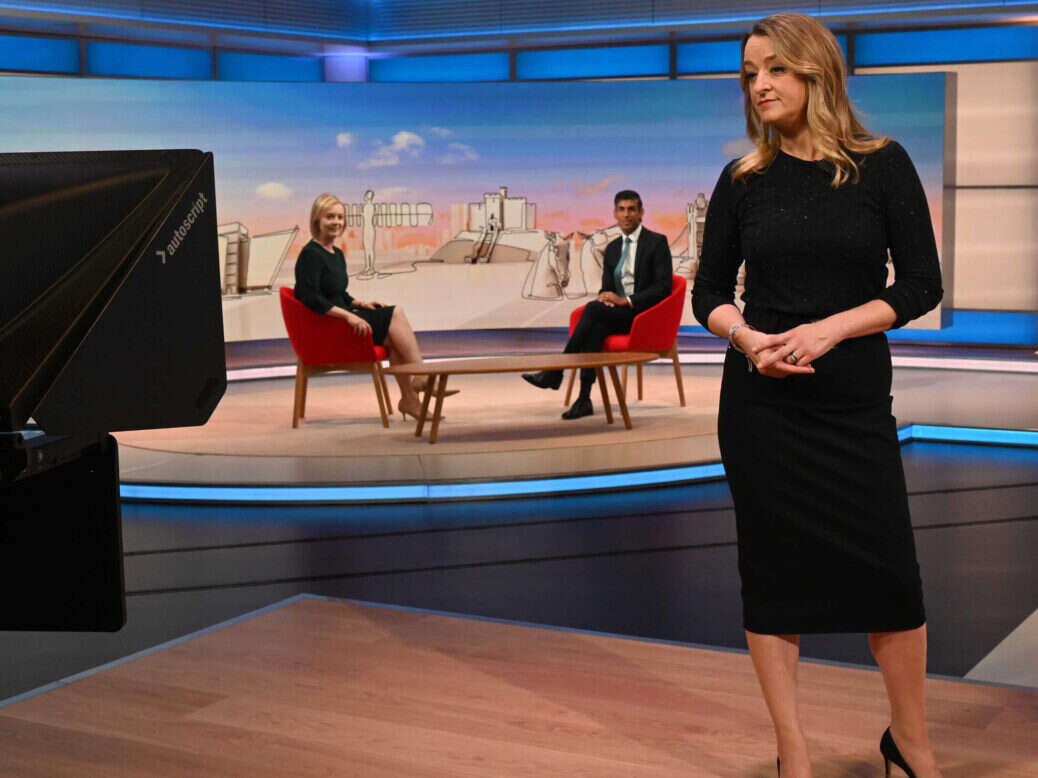
Former BBC political editor Laura Kuenssberg has said the job of broadcast journalists should not be “trying to sway public opinion”.
Kuenssberg, who now presents the BBC’s flagship Sunday politics programme, told the News Xchange conference in Dublin on Monday that there is a “fashion” in the UK at the moment for opinion-led programming.
Although she said there is “fantastic stuff getting made”, Kuenssberg warned “we have to be quite clear as an industry” where the line is between news and opinion.
On a panel titled “The personal frontline: The challenge faced by high-profile broadcast journalists”, moderator Annelies Beck of Dutch public broadcaster VRT asked if it is the job of journalists to impress upon their audience whether, for example, a politician is a liar.
Opinion broadcasting ‘not what we do at the BBC’
Kuenssberg said it was not: “Our job is not to be trying to sway public opinion. Our job is also not to represent public opinion. Our job is to give people good quality information so they can make their own decisions. And that’s simple.”
She said there was “an interesting thing happening in the UK, where there’s a sort of a fashion for journalists to be much more interested in their opinion on broadcast, which is sort of new – of course, it’s not new, but it is a current fashion”.
But Kuenssberg said this was “not what we do at the BBC”.
“This is my personal view, but I think if somebody is wanting news and information, they want news and information. I think we have to be quite careful about where the line is between news and information and opinion.
“Opinion is perfectly legitimate for people to provide, of course it is! And our wonderful newspapers do that in all sorts of different ways.
“But I think for broadcasters there is a fashion for people using their voices.”
The past two years have seen the launch of two opinion-led news broadcasters in the UK, GB News and TalkTV. Meanwhile the lengths to which BBC broadcasters can express their own opinions were widely discussed earlier this year after Match of the Day presenter Gary Lineker tweeted critically about Government immigration policy, resulting in him being taken off air for a weekend.
Meanwhile high-profile BBC presenters Emily Maitlis, Jon Sopel and Lewis Goodall departed the corporation last year to launch daily podcast The News Agents with LBC owner Global. Unrestricted by Ofcom and the BBC’s due impartiality requirements, the trio are freer to mix their perspectives into their reporting. Similarly Andrew Marr, who is an ex-BBC political editor and Kuenssberg’s predecessor in the Sunday morning political programme slot, said he was “keen to get my own voice back” when he left the broadcaster in 2021 – also to join Global.
Kuenssberg did not name any broadcasters or programmes, and stressed that “some people really enjoy” opinionated broadcasting.
“There’s all sorts of fantastic stuff getting made, whether it’s at LBC or a podcast from this, that or the other,” she said.
“But I think we have to be quite clear as an industry that that is different from what I do.”
[Read more: News Agents listening figures ‘beyond our wildest expectations’, says executive producer]
Laura Kuenssberg: We’re not here to talk about ourselves
Regarding the main topic of the panel, Kuenssberg said there were “risks” in making too much out of the abuse of journalists online.
“It’s not a criticism of people who do find this extremely important, and I don’t seek to minimise it – but for me, there’s a real risk as an industry that we focus so much on what the business is like for us, and how terrible it is and how unsafe it is for us doing our job, that we forget what we’re there for.
“We’re not there [to talk] about what it’s like for us.”
Kuenssberg said she was in “an enormously privileged position, working for a fantastic organisation with a wonderful audience” and that she would consequently feel uncomfortable “saying ‘oh, poor me, it’s all really terrible’”.
As the BBC’s political editor across a period that spanned the Brexit referendum, Jeremy Corbyn’s Labour leadership and the first years of the Covid pandemic, Kuenssberg has received substantial abuse online – and was even assigned a bodyguard to cover the Labour Party conference in 2017. She told the conference she turned off her Twitter notifications “years ago”.
But she said that “when you compare what we have to put up with with what journalists working right now in Ukraine [have to put up with], female journalists working in Mexico… and we sit and say, ‘Well someone was rude to me online’…
“You don’t have to Google yourself.”
[Read more: Online abuse toll means fifth of women journalists considered leaving industry]
Email pged@pressgazette.co.uk to point out mistakes, provide story tips or send in a letter for publication on our "Letters Page" blog
